In and Out of Africa
Now We Are Three
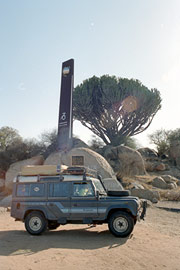 |
| The tropic of capricorn |
|---|
The road from Johannesburg to Louis Tritchard had not miraculously become any more interesting, although the monument at the tropic of cancer had been repainted to hide the graffiti and some of the shotgun marks. At least we now had working brakes which allowed us to travel more safely and at slightly higher speed. The campsite at Louis Tritchard was unchanged, the only challenge being to put up the tent we had borrowed. As time goes by tents seem to look much more simple with fewer guide ropes, pegs and poles. Struggling to put up a the tent is half the fun of camping and tent manufacturers seem to consider it a challenge to make modern simple tents as difficult to erect as possible. After several attempts to fit the long bendy poles into their respective homes we finally had a halfway decent tent for June to sleep in. The roof tent, as usual, took only a few seconds to open out and we were ready for our first night 'on the road again, just you and I (and June)'.
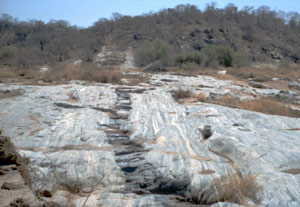 |
| Sand River Gneiss Some of the oldest rocks in the world |
|---|
Once more we cross the Limpopo without seeing a single fever tree. The border crossing seems smooth and fast to us. June is amazed by how tedious and disorganised it all seems. 'Just smile, relax and pretend you have all day', we said, 'Crossing borders here can take hours'. This one didn't take too long at all, only about an hour, and they still didn't think we looked like terrorists! Shortly after the border we take a different route and head towards the Great Zimbabwe Monument. Along the side of the road, nowhere near any game parks, June saw her first game animals. Warthogs, monkeys, little bucky things and even giraffe. With luck like this we might see more animals in six weeks with June than in three months on our own!
The campsite nearest the 'monument' cost Zim $10 each per night. We only had Zim $27 between us and the banks were all closed. Once again we had to persuade the campsite manager to let us pay tomorrow. In the morning we went straight to the bank and returned to the campsite to pay the man. He was nowhere to be found and no one knew where He was. He obviously wasn't desperate for the money so we headed off towards the 'monument'.
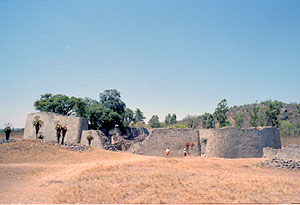 |
| The great Zimbabwe monument |
|---|
It was now springtime and the temperatures were already reaching into the 30°s and a few hours walking around the monument had tired us out. We had hoped to spend the night at the monument in the shadow of it's ancient walls but the modern plumbing had failed. The water did not flow and the toilets failed to flush. Instead we returned to Masvingo for another night, we had to pay for last night anyway!
We made good time to Bulawayo and decided to carry on to Hwange park. This time we managed to avoid any confrontations with the park officials and had time for a short game drive in the cool of the evening.
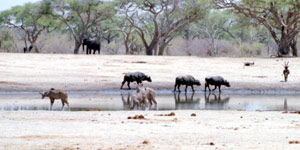 |
| Kudu, Buffalo and Elephant at waterhole |
|---|
This had been one of the most successful days game viewing yet, obviously June had brought some luck with her. This luck continued into the evening when a small group of Banded Mongoose went skittering through the campsite. In the quest to see the 'Big Five' game animals (exactly which animals these are changes depending on which animals are available!) most people overlook the equally fascinating smaller animals. After dark a rustling sound revealed one of these small creatures just beyond the campsite fence. This was a spring hare, a small rabbit like creature with long ears and feet, like a small kangaroo. It even hopped with both feet like a kangaroo, racing across the ground in huge bounds.
Every one kept telling us that the best time to view game was in the morning. We finally decided to test this theory and, although a little dubious, packed up the tent just before dawn and drove into the park almost as soon as the gates opened. Not very far into the park we saw our first surprise of the morning. In front of us was a saloon car with a family of South Africans in it. The driver was driving very cautiously and looking up nervously at the Hyena loping along beside his car. We had seen Hyenas before on television and in Ngorogoro crater and thought they were dog sized animals. This one was a good head taller than the car, about the size of a calf. Hyenas have the strongest jaws of any animal, strong enough to crush Elephant bones and supposedly able to bite through steel. I could almost imagine the driver of the car thinking. "This thing about biting through steel they are making it up, aren't they?". The Hyena got bored with being followed by a car and loped off into the bush. Around the next bend there were about seven Landrovers from the various safari companies and a couple of other vehicles stopped by the side of the road. The whirr of the morning cicadas was drowned out by the sound of camera shutters and motor drives. There in the bush next to the road were two Lions were busy tearing into a fresh carcass, either a Wildebeest or a young Buffalo, it was already difficult to tell. Once again June's luck had held out. Either that or the carcass had been cast to the Lions by some helpful game keeper just before dawn. If I was a Lion I don't think I would choose to catch and eat my meal right next to the road, when I had the whole park to choose from. The positioning did seem remarkably convenient, right next to one of the few places where more than two vehicles could stop at any time.
We gradually worked our way up the park stopping at various pans on the way. It was now well into the dry season and there was very little water in the park. Many of the pans which had been there three months ago were now muddy patches or even completely dry, only the largest pans and the ones with artificial bores still had water. This meant that the animals were much more concentrated than before and easier to spot. One pan near Robin's camp had a large concrete and thatch shelter. The temperatures were getting high now and a shelter was essential for comfortable game viewing. Inside where some people with a picnic hamper and some bottles of wine. They were all set for a very comfortable days game viewing! There was also a very small campsite here, however permission to camp had to be obtained from Harare and must be booked in advance. Near Robin's camp there is a large lake with Hippos and Crocodiles. After three days on the road June had already seen nearly as many animals as we had in three months.
 |
| Various game animals |
|---|
The midday temperatures at Victoria Falls were now almost unbearable so we got up early and walked over the bridge into Zambia. Most of the people passing through the border post were only crossing to see the falls from the other side and the crossing was consequently very quick and they didn't bother about most of the usual entry formalities. On most African bridges, especially those at borders, it was forbidden to stop your vehicle and admire the view. This bridge was no exception. Walking over the bridge we could take our time and admire the view. Assumed, of course, that they only shot at vehicles stopped on the bridge and not pedestrians. The lack of automatic fire seemed to bear out this assumption.
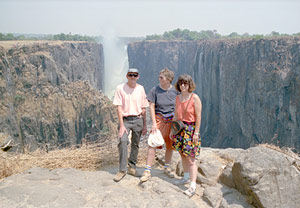 |
| Derek, Fiona and June at victoria falls |
|---|
After we had walked around for a couple of hours and taken the track down to the river, to view the falls from the base, we were in need of a drink. We had found some Kwacha in one of our pockets after the last meal in Zambia with Heather. She also found some extra Kwacha while we were in Bulawayo. They were of no use to her anymore so she gave them to us. The two amounts together came to slightly more than the cost of a meal for three (minus the sodas) three months ago. We thought this would easily buy us three sodas and maybe even a carved stone animal or two. Now the price of a meal for three would only just buy two sodas. For the first time we really got to understand what inflation means to people here and how near to collapse the economy must be.
After walking back across the bridge to Zimbabwe and receiving a few more stamps in our passports, we were hot and tired. The rest of the day was spent resting in the shade under the tent and watching the warthogs wander through the campsite knocking over rubbish bins and generally scavenging for food scraps. At 16:00 it was almost cool enough to emerge and see the Zimbabwe side of the falls. There was much more water flowing over this side, almost as much as at peak flow. The wall of noise, however, was gone and we could talk to each other. Last time we could barely hear ourselves think, let alone converse. As we walked back the sun was low on the horizon, throwing pale rainbows against the pink-orange sky, the spray glowing with the last rays of the setting sun.
From Victoria Falls we had two choices, either drive straight down through Zimbabwe to South Africa and then maybe cut across to Namibia or just spend the rest of the time in South Africa. The other alternative was to drive across Botswana, past the Okavango Delta and then down through Namibia to the South African vineyards. The route straight down to South Africa would be casual and relaxing, much more like a holiday and would go through some reputedly beautiful scenery. The roads would be good and there would be less worry about the consequences of mechanical failure. The route through Botswana was potentially the most rewarding in terms of scenery and experience. It was also much longer and no one we spoke to had any idea of the condition of the roads. Considering the time constraints this route was much more ambitious. It also took us along the fringes of the Kalahari Desert and through the Namib Desert. They say that no one can visit a desert and remain unchanged. Somewhere at the back of my head I could hear the call of the desert faintly beckoning... And it was getting louder. Bravely, or perhaps foolishly, we chose the harder route through Botswana and the deserts.
The first days journey to Ngata was a very straight, well maintained tar sealed road. The road ran parallel with the edge of Hwange park 40 km to the east. All along the road there were Elephant. In fact the major road hazard wasn't potholes it was Elephant droppings. Hit some of these at 80 km/h and you would know about it. You would probably smell it for weeks to come as well! Even though these were Elephant from the park we were outside the boundaries here and an animal outside a park was special. Living free as its forebears have for millions of years before.
The daytime temperatures were now so hot that it was extremely unpleasant driving in the heat of the day. We left Ngata at 06:30 to get most of the driving over before it got too hot. The road to Maun was unsealed, gently corrugated and not too badly potholed. We were driving along desert fringe and dangerous little fingers of soft sand occasionally encroached into the road. The heat from the desert poured in through the window as though someone had opened a furnace door. In the distance there were Baobab trees and the occasional shrubs and bushes.
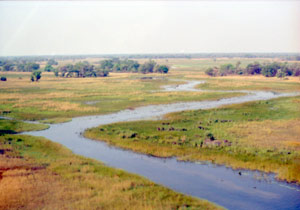 |
| Okovango from the air |
|---|
By the pool a young Belgian woman was talking to another lady: "... Flight booked over the Delta and we really need three more people...". I looked at Fiona, Fiona looked at me and we both looked at June. Nothing really needed to be said. Given the choice between a day in a boat with no shade and an hour in a plane there was no contest. The Belgian couple were on their honeymoon and they had driven to Maun just to fly over the Delta. They had already hired the smallest plane they could find, a five seater. If they could fill it everyone's cost would be reduced. Three hours later we were in a small plane high over the Delta.
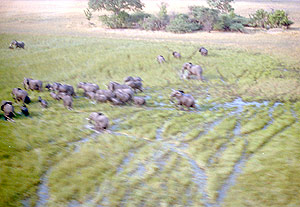 |
| Elephants on the delta |
|---|
As we neared Maun the contrast between the delta and the desert beyond became apparent. There was simply a straight line, on one side of which was a lush green delta teeming with life. On the other was dry yellow sand and a few sad looking fields and some even sadder looking cattle.
Camping at the main campsite in Maun we could hardly expect to avoid tourists altogether, neither did we want to. Well not yet anyway. It wasn't even surprising when some tourists arrived at about 21:00 and woke us up. What was a surprise was looking out of the tent to see that they had parked so close to our ladder that we could barely climb down. If they had parked any closer they would have knocked the ladder over. In a half empty campsite parking so close was inconsiderate in the extreme. Apart from saying 'good grief' and other choice words there was very little we could do about it. We had intended to stay here for another day to rest and do the standard checks on the truck before carrying on. Now we thought it might be best to move on. The heat, the cicadas, the sound of people talking quietly right below us and the braying of donkeys on the delta conspired to ruin our nights sleep.
In the morning we overheard (there was no other choice) the people under the tent discussing going into the delta this morning. With them gone we may as well stay for the day. After the poor night's sleep no one felt like driving anyway. Fiona and June spent the day relaxing by the pool while I did various routine jobs on the truck before joining them. In the afternoon a tour truck arrived and parked close to us. As usual they played tapes incessantly on the truck stereo. This appears to be de-rigeur for tour trucks. The music they play is like 'classic hits' radio frozen in time on the day the driver left Europe for Africa. This truck played nothing newer than 1983. At least they had a decent selection of 60's and 70's music, or music that I liked at any rate.
Fiona and I had soon slipped into the travellers' sleep cycle from before, waking with the dawn and asleep by 20:30. June hadn't adapted and was busy talking to some South Africans by their camp fire. At 21:00 the tour truck was still playing the music quite loudly so I politely asked them to turn it down. Eventually they turned it down to a level comparable with the donkeys and cicadas, which unfortunately don't come with volume controls. At least we could get some sleep, or so we thought.
At just after midnight we heard the sound of raucous revellers wandering past the tent loudly ensuring that the entire campsite knew that they had been drinking. They wandered over to another tour truck which had mysteriously arrived while we were sleeping. I briefly wondered what decade this record collection would be locked into. I was not to be kept in suspense for very long. As soon as someone managed to focus on the on button the tape deck blasted out punk and post punk rock at a considerable volume. The revellers of course had to shout at the top of their voices to compete. After about half an hour of listening to their inane drivel ("and the supermarket in Maun man, I was so stoned, I was sliding down the aisle in my jandals, like it was soo slippery..."). I wandered over and asked them politely to shut the fuck up and stop being such inconsiderate bastards. I tend to become slightly less polite at 01:00. They replied "We can't shut up we're pissed" and proceeded to shout louder and turn the volume on the stereo up. They did move forward to a tape from the 90's but that was really no consolation. At 01:30 even my favourite song would be unwelcome. To make matters worse these great ambassadors for the sophistication of modern western society were, judging by their accents and use of terms like Jandals, in fact from New Zealand, Australia and England. A Jandal is the New Zealand term for that beach footwear consisting of a flat sole and a thin strap held between the big toe and second toes, aka flip flops, thongs etc.). I felt very tempted to remove the GB sticker, the Kiwi and the New Zealand flag from the sides of our truck in sheer embarrassment. Eventually the driver and courier, who were the noisiest of them all got fed up of being noisy louts and passed out. After that the campsite became quiet. The donkeys and cicadas, which had previously kept me awake now chirped a pleasant lullaby to send me to sleep.
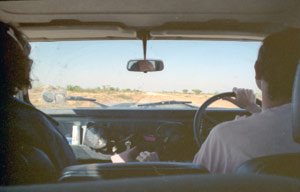 |
| The road ahead |
|---|
The motel/campsite was extremely nice, with a spotlessly clean swimming pool and toilet facilities. I asked the owner what the road to Namibia was like. "It's not too bad but there is a lot of soft sand", he said. "Oh good", I said. He looked at me for a moment and said "Even people in four wheel drives get stuck". "Don't worry", I replied cheerfully, "I think we'll be alright".
He didn't look convinced. He was probably fed up with towing overconfident tourists, in hired and unfamiliar four wheel drives, out of the sand. I thought it sounded like fun. In fact it was. The road was being improved and there were several stretches of detour driving through the desert next to the road. Driving through soft sand or deep snow gives a muffled floating feel to the truck, swaying gently from side to side in the ruts of other vehicles. The important things are to be in the right gear and to never stop moving. In the middle of the very sandiest stretch there was a truck stranded in the middle of the single track road. The only way round was to climb the steep bank at the side, without tipping the Landrover, drive past and then back down the steep bank at the other side. The driver and his mate were struggling to remove the tyre from the wheel rim with only one tyre lever. I got out my three smaller levers and between us we managed to free the tyre. It was really too hot for that kind of work and I was glad start driving again.
The border into Namibia was once again quiet and efficient. They are in the same customs federation as Botswana so we didn't get searched. This was also the first time we had travelled between two countries and not had an exit stamp on our Carnet. As we came out of the customs hut in Namibia a man came over. At first I thought he was another customs official. "Which one is your wife?", He asked. I pointed to Fiona. "How much do you want for the other lady?", he asked. After a fleeting moment wondering how to fit a herd of cattle into a Landrover and trying not to laugh I replied, "Ah, she's not for sale". He considered this to be a good bargaining ploy and looked about to launch into some lengthy bartering. I couldn't work out whether he was joking or serious so I replied politely "Really, she's not for sale". He gave me a strange look as if to say I was an idiot to miss out on this great opportunity, got into his pickup truck with two ladies, presumably his wives and drove off. I found out later that 30 head of cattle would have been a good price but that I should have held out for 40.



